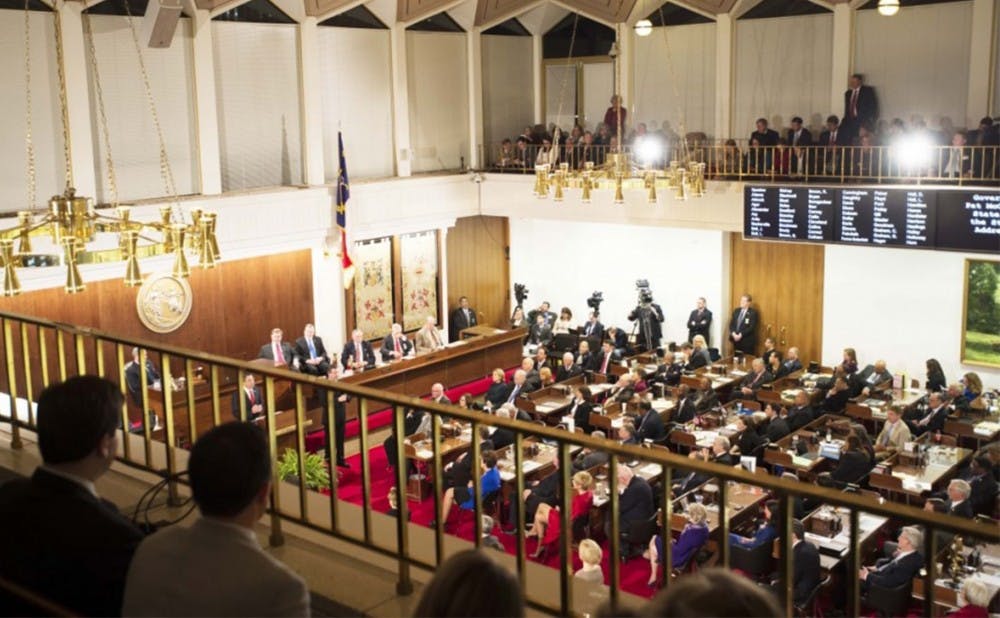North Carolina has received national attention throughout the past year for its battle regarding House Bill 2.
The controversial bill had two parts—the first required people to use the restroom for their “biological sex” and the second barred local governments from creating their own anti-discrimination policies. HB2 became law in March of 2016 in response to an anti-discrimination ordinance created by the city of Charlotte for LGBTQ+ people.
The law incurred a large amount of ire and pushback within the state and nationally. In April 2016, Durham City Council formally passed a resolution against the bill, calling for its repeal.
“The Durham City Council, the Durham County commissioners and the school board have all come out strongly against HB2," said Wendy Jacobs, chair of the Durham Board of County Commissioners.
She said that the "bathroom aspect" of the controversial law was "really a smokescreen" to hide the fact that it was actually an "anti-labor" law.
“If you feel like you’ve been discriminated against because of your age, or your race, or because you’re handicapped or you’re a veteran, you have lost your rights in this bill,” Jacobs said.
Alongside the intrastate political resistance, North Carolina also faced economic pressures.
Paypal and Deutsche Bank both cancelled their planned expansions to North Carolina, and the National Basketball Association issued a statement stating they would reconsider hosting the NBA All-Stars game in Charlotte in 2017, citing HB2 as a “discriminatory law.”
In September 2016, a federal court issued an injunction against the University of North Carolina system, prohibiting the university system from enforcing the portion of the law that requires individuals to use the bathroom corresponding to their “biological sex.”
The bill was also criticized for including no clear method of enforcement.
In November of last year, the bill was a major issue in the state’s closely contested gubernatorial election. Roy Cooper—who ultimately won the race by less than one percent of the vote—campaigned on a repeal of HB2, defeating incumbent governor Pat McCrory, who continued to stand by his support of the law.
Then, in December, McCrory called for a special session to discuss repealing HB2 after Charlotte temporarily repealed its original nondiscrimination ordinance.
After Cooper took office, conversation around HB2 temporarily subsided. In March, House Bill 186 began to be discussed as a bipartisan “compromise” on HB2.
HB186 would allow cities and counties to create their own nondiscrimination ordinances, as Charlotte did. However, religious organizations could be exempt from such ordinances, and the ordinances would be subject to repeal by ballot referendums. HB186 would also have imposed harsher penalties for crimes committed in bathrooms and changing rooms.
It, however, never became law. Then, at the end of March, HB142 was signed into law, despite doubts that the compromise-repeal would be successful.
HB142 had some similar provisions to the earlier-proposed HB186, but also diverged in other ways: it repeals HB2, restricts transgender students from using the restrooms they identify with and prevents local governments from enacting their own anti-discrimination ordinances until 2020.
“We are pleased that the legislature has moved to reverse a misguided law that has caused significant harm to the state of North Carolina,” Brodhead told The Chronicle in March, referring to HB142. “This compromise is far from perfect. We continue to urge the governor and members of the legislature to find common ground that ensures equal protection under the law for every member of our community.”
However, not all groups were satisfied. Many groups, including Duke’s Blue Devils United, called HB142 insufficient.
At the time, BDU president-elect and current senior Melodie Bonanno said HB142, like HB2, is a discriminatory law against LGBTQ+ people.
"Passed out of an attempt to meet the NCAA’s deadline to repeal HB2, this new bill came into existence as a closed door, backroom deal that included no input whatsoever from the LGBTQIA+ community," she wrote. "While it repeals HB2 on paper, it in actuality replaces the old bill with one that prevents municipalities from offering legal protections to LGBTQIA+ people until 2020 and outright bans protections for transgender individuals in ‘single-sex spaces’—i.e. restrooms—forever."
HB142 did, however, work to ease some of the financial pressure being applied to the state over HB2. The NCAA removed its prohibition on holding athletic championships in NC thanks to the compromise.
Hopes of hosting March Madness in North Carolina was likely one reason why legislators scrambled to repeal HB2. In April, the NCAA formally announced that men’s basketball tournament games will be held at Greensboro Coliseum in 2020, and the ACC also returned games to the state.
The turmoil over HB2 is not a singular event in North Carolina's recent history, but rather another chapter in its mixed record regarding LGBTQ+ rights.
Prior to 2012, same-sex marriage was not recognized in the state. That year, voters approved Amendment 1—which codified a ban of same-sex marriage state-wide. That law was then overturned in 2014 by a federal court decision declaring it unconstitutional.
Currently, discrimination based on gender identity or sexual orientation is not prohibited and individuals are prevented from suing for discrimination based on those traits.
HB2, and its subsequent repeal, mark another chapter of the state's evolving stance on LGBTQ+ rights, although not all are satisfied with this most recent installment—HB142.
"This bill does not just perpetuate discrimination—it makes it illegal to protect against it," wrote Bonanno on HB142.
Get The Chronicle straight to your inbox
Signup for our weekly newsletter. Cancel at any time.

